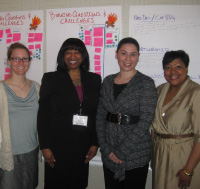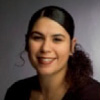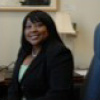 |
|
| SEARCH | MULTICULTURAL TRAINING | |||||||||||||||||||||||||||||||||||||||||||||||||||||||||||||||||||||||||||||||||||||||||||||||||
|
Allyson Fauver Sara Xayarath Hernandez DiOnetta Jones Renetta Tull Speaker videos and powerpoint presentations from the May 2011 Network Meeting are offered here along with related resources for further inquiry and investigation into these topics. Summaries from "breakout sessions" facilitated by each speaker are also provided.
Allyson Fauver A Brief Diversity Briefing. Allyson Fauver opened the Multicultural Training plenary session by introducing the Institute for Broadening Participation’s three guest speakers (see following) and outlining a schedule for the session. She then emphasized the importance of understanding basic diversity-focused concepts (e.g., underrepresented groups, broadening participation, the pipeline), and briefly discussed why diversity in the ocean sciences matters from the perspectives of national STEM competency and Science’s broader impacts on our society.Director of Policy and Analysis; Co-PI: Pathways to Ocean Sciences Institute for Broadening Participation
Recruitment is about creating an inclusive vision; students need to see themselves as scientists. In this presentation, Sara Hernandez related strategies to attract, recruit and retain under-represented minorities (URMs) in STEM programs even before they begin to contemplate the "college scene". Sara describes several successful models for engaging students and their families – a crucial component of the engagement process – in STEM activities such as Cornell’s CATALYST Academy for first generation high school students and the Urban Bird Garden. Sara also walked the audience through the American Association for Undergraduate Women’s key recommendations for attracting, retaining, and counteracting biases, which she noted is also highly applicable for URMs and under-represented groups of students.
DiOnetta Jones Recruitment is Important -- Retention is Critical. In this presentation, DiOnetta Jones shares strategies to retain under-represented minorities in college and universities to pursue graduate and professional degrees. She highlights the nationally recognized Meyerhoff Scholars Program that supports URM students to successfully attain advanced degrees in STEM fields, and then walks us through key "lessons learned" from this program that she believes could be translated to other academic settings. Associate Dean and Director Office of Minority Education, Office of the Dean for Undergraduate Education Massachusetts Institute of Technology (MIT)
Renetta Tull Retention involves skill-building, support structures, and communication. Renetta Tull gave a brief introduction to NSF-funded Alliances for Graduate Education in the Professoriate (AGEP), and how these multi-institutional partnerships guide and support URMs through graduate school and into professional careers as faculty members. This includes collaborating closely with national and regional professional organizations serving URMs (e.g., SACNAS), and providing timely support to help students writing their dissertations (Dissertation House,), on the job market for the first time or presenting at their first professional conference (Southern Regional Educational Board). She concluded with a ‘call to action’ for the COSEE Network. These “Strategic Actions” that have been shown to be successful in AGEP programs across the US including recommendations for recruitment, retention, creating a more inclusive graduate community, and building crucial support structures, such as peer and faculty mentoring programs.Assistant Dean for Graduate Student Development and Director University of Maryland (UMBC, UM Baltimore, UM College Park) & UMBC Graduate School
|
|||||||||||||||||||||||||||||||||||||||||||||||||||||||||||||||||||||||||||||||||||||||||||||||||
|
|||||||









